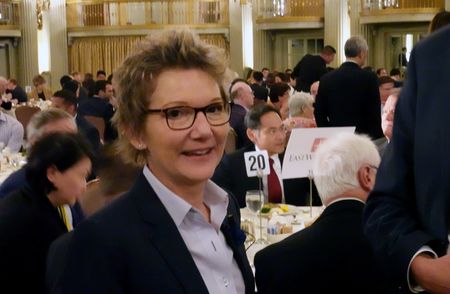 1
1 1
1
By Michael S. Derby
NEW YORK (Reuters) -San Francisco Federal Reserve President Mary Daly on Monday said it’s too soon to say whether the U.S. central bank will raise interest rates at its June 13-14 policy meeting.
“We have to be extremely data-dependent, and that’s why, even three weeks in advance of the meeting, our next meeting, it’s still a lot of time to collect information before we make a decision about what to do in June or what to do for the rest of the year,” Daly said in a virtual appearance before a gathering held by the National Association for Business Economics and Banque de France.
Daly, who does not have a vote on the central bank’s rate-setting Federal Open Market Committee, was tacking a question about whether, after just over a year of aggressive rate rises aimed at lowering inflation, officials will stand aside and not raise the target for the benchmark overnight interest rate at next month’s meeting.
Officials have opened the door to not raising what is now a federal funds rate target range of between 5.00% and 5.25% amid signs the Fed’s past actions are slowing inflation and bank sector stresses may weigh on growth.
Daly noted in her remarks that tighter credit conditions, some of which would be expected and some of which are tied to troubles faced by some banks in March, are equivalent to perhaps one to two rate rises.
Speaking last Friday, Fed Chair Jerome Powell said “our policy rate may not need to rise as much as it would have otherwise to achieve our goals” given the tightening in credit conditions.
Daly said “it’s a distraction really, to say what we’re going to do necessarily in June” and that attention is better focused on what the Fed is looking at to drive its policy choices. “Meeting-by-meeting decisions become really the most prudent path” for central bankers right now, she said.
Daly also noted that it would be a “historic anomaly” for the Fed to get inflation back to its 2% target and keep the unemployment rate, now at 3.4%, under 4%. Instead, she said some rise in the jobless rate looks probable and noted it would be “completely reasonable” to see the jobless rate go to 4.5%.
(Reporting by Michael S. Derby; Editing by Mark Porter and Paul Simao)